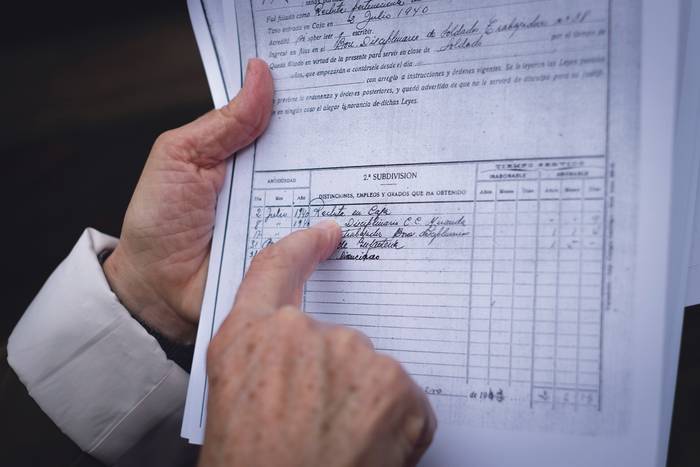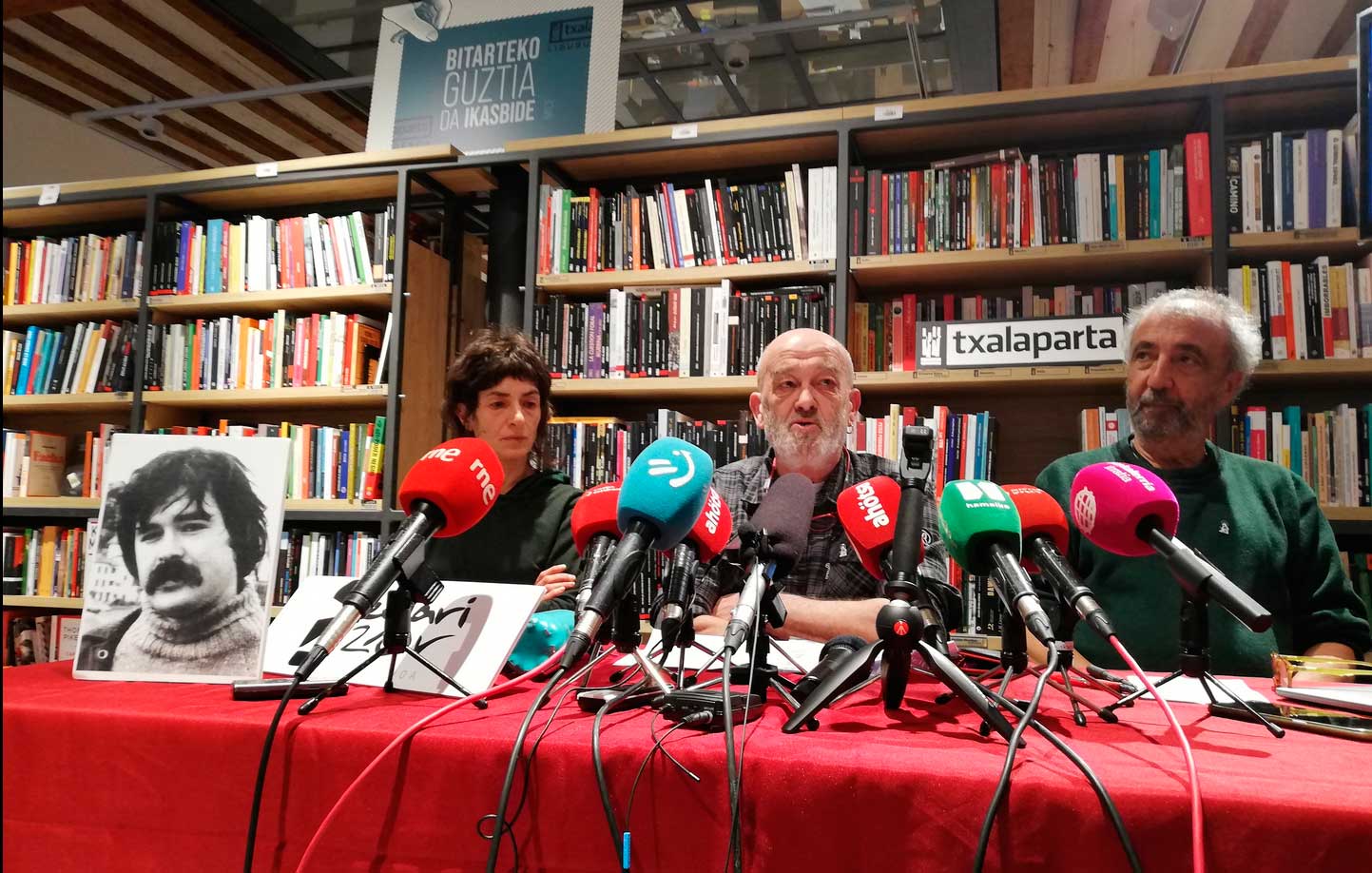What relationship do you have with this collective complaint?
My father was in Igari's concentration camp. The road linking Igari, Bidankotze and Roncal was built by local prisoners. One thing I want to stress is that all of this happened after the Civil War. The war ended in 1939 and my father entered Roncal in 1940. It is important for me, because it makes it clear that what happened in it was mere revenge. The fascists won the war, but it seems that this was not enough for them. They wanted to humiliate, subdue and crush their rivals.
My father stayed about a year. He was then sent to Burgos for military service. He spent seven years away from home.
What's your father's story?
We don't know. He didn't tell us many things, I think he didn't like to talk about it. What we know is that when the war broke out, he volunteered. The father was Santurtzi. He was very communist out of conviction, but we thought he was not a party militant. He apparently had the opportunity to decide with the communist party where and how he wanted to participate in the war. Choose the tanks. It was a guide truck, like our grandfather. On the left were a few driver trucks and with this experience he started driving tanks.
He left home at the age of twenty. We know that for four years he was fighting in different parts of the Spanish state. In Extremadura it seems that it spent a lot of time, it was also in Madrid. We lack many gaps around his career in war.
He finally went from Santoña with a boat to France. From France he returned to the Spanish state from the Catalan people of Portbou. He went down to Alicante where he was imprisoned.
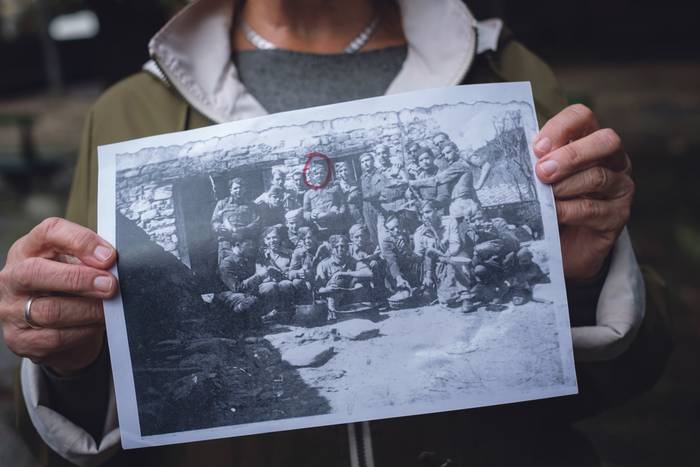
Was it after the war?
We assume yes, but we have nothing clear. The war ended in 1939, and according to the documents, she was imprisoned in Roncal in 1940. What happened during all these years? It's a shame, but we're not clear, my father never told us.
I had few things to say. He only referred to the issues easier for him. A nephew once asked him if he killed a lot of people, and he said he didn't want to put us. Throughout the Civil War, I was going to accumulate many painful memories.
What was your father charged with?
The accusation he received was disaffection for the regime. So they described anything, any dissent or any attitude towards the Francoists. With this accusation he was sent to perform slave labor.
Unlike war issues, Roncal and Igal talked a lot with their father at home.
He talked more about the Roncalese era. He was in prison for a year, but he was lucky with other prisoners. In order to carry out the work on the road they needed drivers with driving licences, including the father. Thus, they handed him a truck to take care of the transportation of the materials, had a more “comfortable” prisoner than the prisoners who worked in the hand.
My father slept at a senior house, he called the senior flat. This house is still in Roncal, we have ever visited. The remaining prisoners lived in unfortunate conditions in tents and barracks. In Roncal winter is very cold and more so at that time. As his father told us, the rivers froze and the cars pass over. We cannot even imagine that today.
How many people were held in the concentration camp?
Between 2,300 and 2,400 prisoners. There are a lot of people in very harsh conditions. According to her father, besides working very hard, the treatment was very strong. Illness, beatings, murder... was a daily occurrence.
Even though his father was in other conditions, he told us that he had also been at risk. The truck had to travel dangerous and icy roads. In addition, he had to drive the truck with an escort at all times. His guardian would often be drunk and on more than one occasion he made threats with a gun.
The families of prisoners have to do with a memorial association that addresses the issue.
We have been attending the act of memory organized by the Way of Memory around Igari for more than twenty years. There is a monolith on the edge of the road, and every year we gather together the relatives of the repressive allies. So we knew the association.
We continue to gather family members from all over the state. Five years ago, the last retaliation there, bilbaíno Ortiz Alfau, died. They also come to the tribute from Jaén, Asturias, France…
For me it is a very important act, and I am very grateful to the work done over all these years by the members of the association. They have kept their memory alive. Fernando Mendiola wrote a book on the events in the concentration camp. Today they continue to investigate, there are many things that need to be brought to light.
These kinds of jails have also been in more places. Very close, as in Orduña. How little we know about this. We hope that the path taken with this complaint will serve to clarify further massacres.
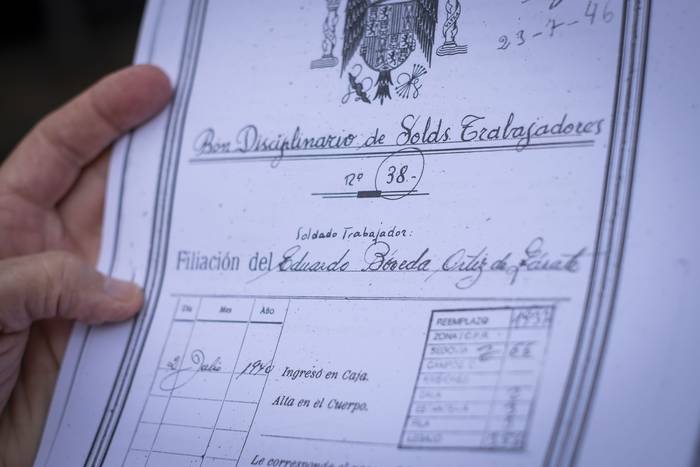
You are the first collective complaint against the labour slave of Franco. How has the process been? What work have you done?
Madrid attorney Jacinto Lara, along with the association Caminos de la Memoria and the State Defense Coordinator of the Querella of Ceaqua Argentina, has prepared all the documentation to file the complaint. They had everything very well worked. We were informed at the beginning of September. Family members have also had to submit a number of documents. We have had to go to the military archive of Guadalajara to obtain the military registration of his father. We received the documentation in three weeks. With this and with the testimonies of his father they prepare everything.
It has been very simple for us. We only have to thank all those who have organised the complaint.
He mentioned that they went to the military archive in Guadalajara. What did you get out of him?
The registration of prisoners working as slaves in concentration camps was in the hands of the military. Slave groups were called welded working battalions. The military record records the time the father spent in the hands of the army. So we learned that July 2, 1940 took place in Miranda and from there it was sent to Roncal on July 17, 1940. We knew nothing about it.
Another surprise is found in the documents extracted from Guadalajara. He was sent from Roncal to Burgos in 1941. The military file shows that he left the Roncal concentration camp in a ET-59510 truck. We have two pictures of his father from the time he passed, one of them next to the truck he was driving, the same one that took him to Burgos. His father called him a fordite with affection.
Twelve families have filed this collective complaint, but Roncal's prisoners exceeded 2,000.
Prisoners from different parts of the Spanish State met in Roncal. Just as our father told us few things during the war, there will be great ignorance among the relatives of the prisoners in the concentration camp. This is one of the objectives of the complaint, to identify more relatives. We have received calls that we have begun to move now, for example from Asturias. All the prisoners there have already died. Families will know that some anecdote or family member was in prison, but in general they will not know what happened in her. My father, as he said, told us little, surely for fear. Only before his death did he confess that he was a political commissioner in front of the Republicans. Being a political commissioner meant a direct shooting. Until the last moment, he was afraid to recognize him. I regret not knowing more, but we have also worked to recover that memory. We hope that this will open up and restore the dignity of our family members. They were not criminals, they were not perverse. They were people who fought with dignity for the people.
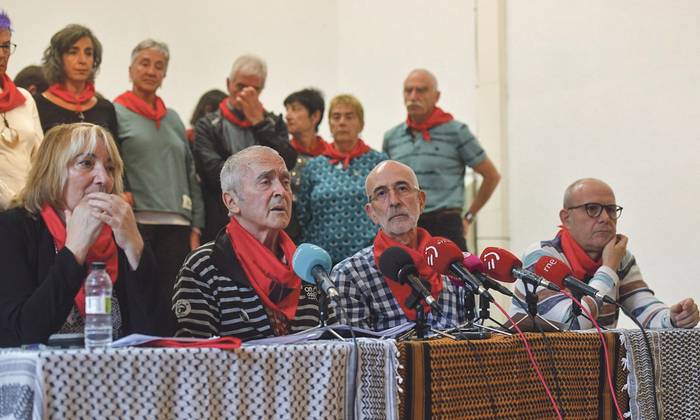
As for the judicial route, what is the trajectory of the complaint?
We do not yet know whether the Aoiz court has accepted the complaint. Then we will see how far it goes. For the moment we are going to present motions in different municipalities, which will be discussed in the plenary of the City of Laudio in November. Their aim is to collect protections. The complaint will reach Argentina, but who knows what comes out of it.
We are only asking for recognition. International law qualifies events in Roncal as crimes against humanity. That is what we demand, justice, reparation and truth.
It is not the first time that the massacres committed by the Franco regime reach the Argentine courts. Isn't it strange to have to seek justice so far?
It's very curious. But it is clear that there is no justice here. They say that we live in democracy, but I still find it hard to believe.
Why is it important to bring to light what happened at Roncal and to reclaim the memory of former prisoners?
Firstly, I believe that we have a need with them, who have been forgotten and it is time to recognise that reality. Also to claim their dignity. They were named criminals, but they were not criminals, fought dignified in the war and were imprisoned at the end of the war, pure revenge.
Finally, I think it is vitally important to explain what happened here in the Civil War and Franco. It is very easy to talk about the massacres carried out by Hitler.
Nothing seems to have happened here. It is very important to recover memory, especially for young generations, it is our history. The only guarantee that this will not happen is to make known what happened.
